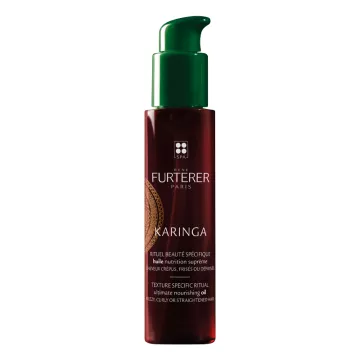
What is frizzy hair and how can I identify it?
Frizzy hair is a type of hair characterized by tight curls and an often voluminous appearance. It is particularly common among people of African descent. The texture of this hair can range from fine to thick, but it is generally very fragile and requires special care. To identify if your hair is frizzy, look at the size of the curl: if it's extremely small and tight, like a spring, your hair is probably frizzy.
How do I care for frizzy hair?
Caring for frizzy hair requires a specific routine that deeply moisturizes and nourishes. Regular use of natural oils such as coconut oil or argan oil is essential to maintain hydration. We also recommend weekly hair masks to nourish hair follicles and shafts, and the use of wide-tooth combs to detangle damp hair to prevent breakage.
What products are recommended for frizzy hair?
For frizzy hair, we recommend sulfate-, alcohol- and paraben-free products, as these substances can dry out hair and make it more fragile. Opt for shampoos, conditioners and masks enriched with nourishing natural ingredients such as shea butter, aloe vera or olive oil.
What are the best styling techniques for frizzy hair?
Hairstyling techniques for frizzy hair should minimize manipulation to reduce breakage. Protective styles like braids, twists or chignons are ideal, as they keep hair tidy without too much traction on the roots. Avoid excessive heat from appliances such as straighteners or curlers, which can damage your hair's natural structure.
What are the specific challenges of frizzy hair?
The main challenges associated with frizzy hair include its tendency to dryness, breakage and difficulty in detangling. These characteristics require constant care and attention to maintain hair health and vitality. The key is regular moisturizing and the use of techniques and products adapted to their delicate nature.
Is it possible to color frizzy hair without damaging it?
It is possible to color frizzy hair, but it is crucial to choose gentle coloring products and to prepare the hair before and after the coloring process. We recommend deep moisturizing and protecting hair with fortifying treatments to minimize damage.
How can frizzy hair be protected while sleeping?
To protect frizzy hair during sleep, we recommend using a satin or silk night cap. These materials help reduce friction between hair and pillow, minimizing breakage and preserving hair's natural moisture. You can also wrap your hair in a silk scarf for the same protective effect.
What is the ideal washing frequency for frizzy hair?
The ideal washing frequency for frizzy hair depends on sebum levels and product build-up. Generally speaking, we recommend washing frizzy hair once a week. This keeps the scalp clean without drying out the hair. Using a gentle, moisturizing shampoo specially formulated for frizzy hair can help maintain the natural balance while cleansing effectively.
What are the common mistakes to avoid with frizzy hair?
Common mistakes to avoid with frizzy hair include excessive heat, dry brushing and lack of hydration. Heating appliances can alter hair structure and increase the risk of breakage. It's also crucial to avoid combing or brushing frizzy hair when it's dry; instead, detangle while hair is damp and well-conditioned to reduce breakage. Finally, don't neglect daily moisturizing with appropriate oils or creams to prevent dryness.
How can I stimulate frizzy hair growth?
To stimulate frizzy hair growth, it's important to adopt a balanced diet rich in essential vitamins and minerals. Regular scalp massage can also improve blood circulation, promoting better growth. Be sure to include protein and antioxidants in your diet, and consider supplements such as biotin or vitamin E, which are known to support hair health.
Is it safe to straighten frizzy hair?
Straightening frizzy hair is possible, but must be done with care to avoid damaging it. It's crucial to use a heat protector before straightening, and to set heating appliances to a moderate temperature. It is also advisable to limit the frequency of straightening to preserve hair health. For long-lasting, less damaging results, consider permanent straightening methods performed by professionals, while maintaining an intensive care routine to counterbalance the effects of the treatment.